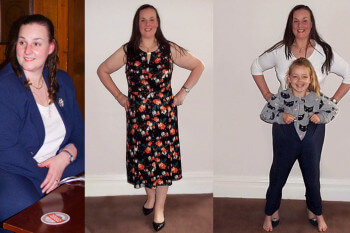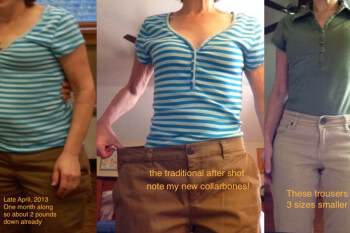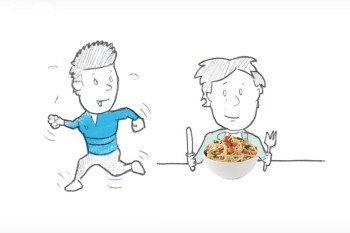Intermittent Fasting FAQ
1. Why is fasting important and useful?
- How much weight will I lose from intermittent fasting?
- I have heard that fasting is good for my long term health, reducing the risk diabetes, heart disease, cancer and Alzheimers. Is this true?
2. The basics
- What is IF?
- What is a WoE?
- What is TDEE?
- What is the 5:2 diet/The Fast Diet/4:3/16:8/19:5/ADF?
- Is fasting safe for everyone?
- What is a fast day?
3. How do I do intermittent fasting?
- Do fast days have to be consecutive?
- Do the 500/600 cals have to be spread across the day or in 1 meal?
- Are there any rules about what I should eat on a fast day?
- Are there any rules about what I should drink on a fast day?
- What should I eat on my non-fast days?
- Should I count calories on non-fast days?
- Can I exercise on fast days?
4. Common worries about fasting
- Will I get grumpy when I am fasting?
- Will I get low blood sugar and be unable to concentrate?
- Is fasting really hard? How can I make it easier?
- I’ve not lost any weight! What have I done wrong?
5. About FastDay
- How does FastDay work? How should I get the best out of it?
- What is the FastDay story? Why do you exist?
1. Why is fasting important and useful?
Q1. How much weight will I lose from intermittent fasting?
The average weight lost per week in the FastDay community is around 1lb (just under half a kilo). Naturally, this varies by individual. Some people lose weight much more rapidly, particularly at the start, while others make progress more slowly. Please do not be upset if you do not lose weight rapidly, fasting is a Way of Eating for life, not a quick fix – and you will reach your target weight eventually if you stick at it. Learn more about typical weight loss from fasting.
Q2. I have heard that fasting is good for my long term health, reducing the risk diabetes, heart disease, cancer and Alzheimers. Is this true?
Fasting is good for your health in two ways. First, if you are overweight and you lose weight, your health risks will generally improve. This is well known.
Fasting also appears to have health benefits over and above the benefits of weight loss. These will probably include reduced risks of the major diseases you have mentioned: diabetes, heart disease, cancer and Alzheimers. The science in this area is not yet conclusive, and we are watching it closely. Learn more about the health benefits of fasting or about the science of fasting.
2. The basics
IF stands for Intermittent Fasting, a term which covers several different Ways of Eating that involve fasting for at least a part of the day. For a full guide to the different versions of intermittent fasting, see our section on different ways of fasting.
WoE means a Way of Eating. Intermittent fasting fans often like to refer to intermittent fasting as a Way of Eating, rather than as a diet, because it is a sustainable long term solution and more than just a short term way of losing some weight (although it is good for losing weight too, and we are all for shedding those unwanted pounds).
Your TDEE is your Total Daily Energy Expenditure – what you would burn in calorie terms on a normal day. You can calculate your TDEE using our calculator.
Q4. What is the 5:2 diet/The Fast Diet/4:3/16:8/19:5/ADF?
These names refer to different types of intermittent fasting. In the 5:2 diet (aka The Fast Diet), 4:3 and ADF, you fast for a number of days each week (ADF stands for ‘Alternate Day Fasting’, where you fast every other day). 16:8 and 19:5 refer to ‘fasting windows’, where you can only eat during your window of say 8 hours in each 24 hour day. It is not as complicated as it sounds. See our guide to the different versions of intermittent fasting.
Q5. Is fasting safe for everyone?
For most people intermittent fasting should be no problem. There are, however, certain groups who should not fast:
- Children
- Pregnant women
- People with Type 1 diabetes
- Anyone suffering from an eating disorder
- Anyone who is already extremely lean or underweight.
If you are on medication or concerned about your suitability for IF please consult your doctor. Don’t take any risks.
A fast day is a day in which you are fasting. Usually this means restricting your calories to 25% of your TDEE – normally 500 calories for women and 600 calories for men. Find out more about the basics of fasting.
3. How do I do intermittent fasting?
Q1. Do fast days have to be consecutive?
No. In fact, we recommend that they should not be consecutive, and most people prefer it that way. Monday and Thursday are the most popular fast days, but you should do whatever suits you best that week.
Q2. Do the 500/600 cals have to be spread across the day or in 1 meal?
It’s up to you. Some people split their calories across breakfast and dinner, but most people prefer to save their calories for a good sized evening meal. No one yet knows whether there is any health advantage to saving up the calories for one meal. Find out more about eating on a fast day.
Q3. Are there any rules about what I should eat on a fast day?
No, there are no rules and you can be flexible. Of course, its best to consume foods that are healthy, and that fill you up without containing too many calories. Find out more about eating on a fast day or look at our fast day recipes.
Q4. Are there any rules about what I should drink on a fast day?
Again, no rules, except that you need to drink a lot or you may get headaches. We normally get a lot of water from food so if you are not eating you need to drink more to compensate. Naturally it makes sense to drink things that are no or low cal. Most fasters drink water, fruit, green or black teas or coffee. Find out more about eating and drinking on a fast day.
Q5. What should I eat on my non-fast days?
You should just eat normally. Some people expect to feel hungrier on non-fast days and to eat more in compensation for their fasting. If you go crazy on non-fast days, and eat lots of doughnuts, you are unlikely to lose weight that week! But most people have the opposite experience – and find that their appetite is reduced not increased on non-fast days. Check out our food section, designed for fasters.
Q6. Should I count calories on non-fast days?
There should be no need to count calories except on fast days. One of the best things about this way of eating is that you don’t have to be on a diet at all for 5 days a week. Some people do count calories – either for interest or because they are afraid they may overcompensate on feed days. Learn more about how to eat on non-fast days.
Q7. Can I exercise on fast days?
Yes! Exercise on fast days will help use up our fat stores more rapidly. Many experienced fasters say they feel great when they exercise on a fast day and they have more energy. However, it is probably unwise to attempt endurance events, such as running a marathon! Please ensure you keep hydrated. For more information on exercising when fasting, look at: getting started – should I exercise.
4. Common worries about fasting
Q1. Will I get grumpy when I am fasting?
Some people get grumpy on a fast day, especially around 4pm or 5pm. We find its best to go for a walk, have a cup of tea, or a 100 calorie snack. Or you can visit our FastDay forum for a chat with your supportive fellow fasters. Like a hunger pang, it will pass! Learn more about what to expect with fasting.
Q2. Will I get low blood sugar and be unable to concentrate?
Some people do experience the feeling of ‘low blood sugar’, especially when they are new to fasting. It usually happens because your body is not yet used to using fat as a fuel, or due to dehydration. Make sure you are drinking plenty of water, and hang in there – your body will get better at burning fat as you become a more experienced faster. Learn more about what to expect with fasting.
Many people choose their fast days to avoid stressful times or special days requiring 100% concentration. See our top tips for fasters.
Q3. Is fasting really hard? How can I make it easier?
Some people find their first few fasts difficult, but it soon gets easier. Many experienced fasters look forward to their fast days. Learn more about getting started.
FastDay is here to make fasting easier. That’s our mission. Read about us.
Q4. I’ve not lost any weight! What have I done wrong?
Probably you have not done anything wrong. It is to be expected that there will be some weeks when your weight does not change or even may appear to increase. There are lots of possible reasons for this. See our troubleshooting section or the frequent discussions of this on our FastDay forum. The first thing to do, therefore, is to be patient for a couple of weeks (hard, we know). If you still don’t lose any weight, you need to look at whether you are miscalculating your fast day calories, whether you might be over-eating on feed days or even under-eating on fast days.
5. About FastDay
Q1. How does FastDay work? How should I get the best out of it?
FastDay gives you the things you need to succeed with Intermittent Fasting. That means:
-
Information you need, especially when you are starting out – for example, tips from experienced fasters, and great recipes for fast days.
-
Tools to make it easier and to help you stay motivated – for example a tracker for your progress over time
-
Friends and a community. As in so many areas of life, you will be more successful if you help other people and allow them to help you. FastDay is social, and designed to help us succeed together.
Learn more about how FastDay works.
Q2. What is the FastDay story? Why do you exist?
FastDay was created by fasters for fasters. It is designed to help us all succeed. We care A LOT. Learn more about us and our story.









